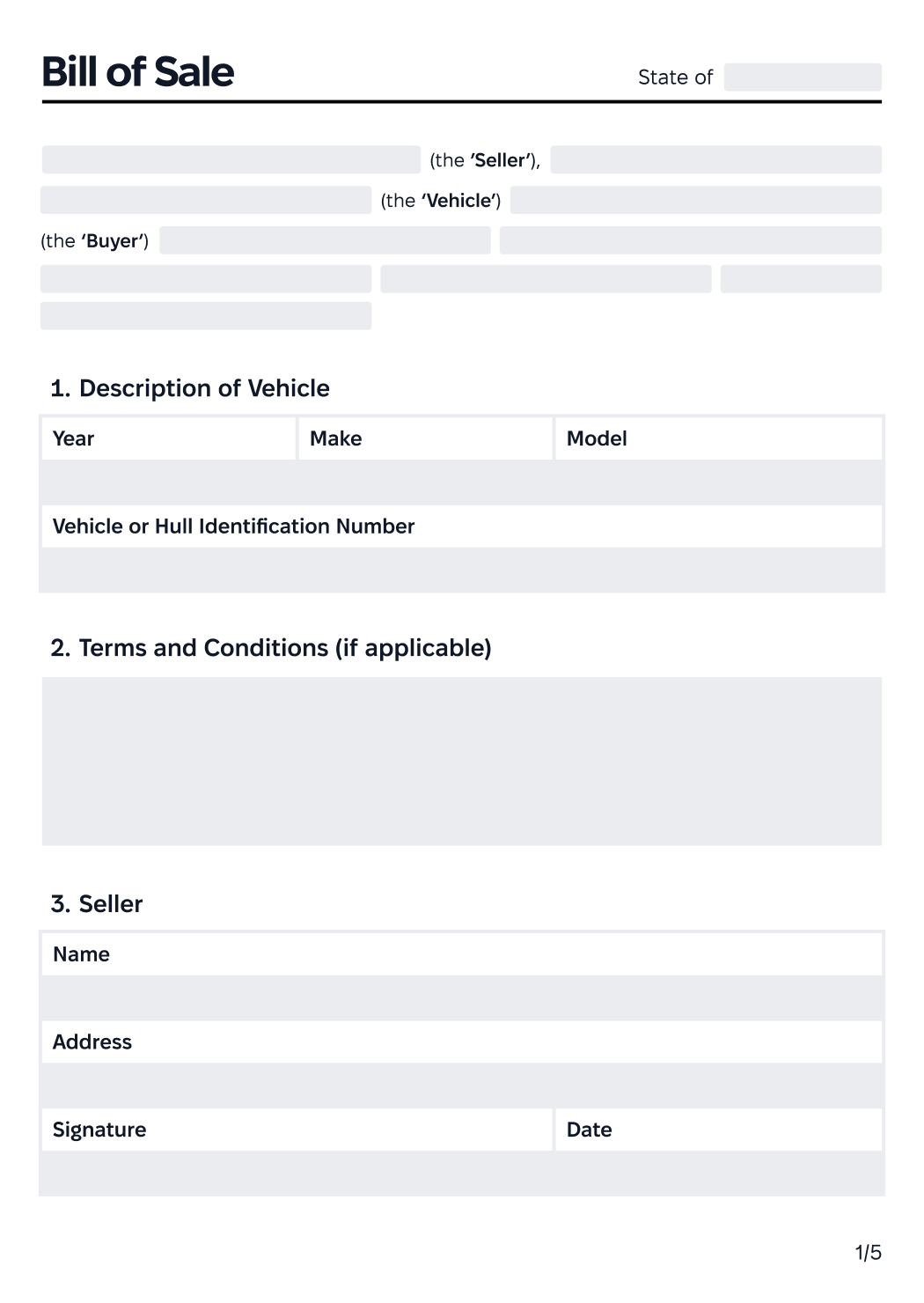A bill of sale is an official paper that shifts ownership of an item from one individual to another. These forms resemble store receipts but serve the purpose of documenting the sale or transfer of valuable items such as automobiles (view Auto bill of sale).
This document safeguards both the buyer and the seller against potential legal conflicts pertaining to the condition or ownership of the item.
The majority of states mandate a duly completed vehicle bill of sale for registering a motor vehicle at the DMV, and it is often advised to use a bill of sale when buying or selling any item exceeding $500.
Bill of sale forms—by state
- Alabama
- Alaska
- Arizona
- Arkansas
- California
- Colorado
- Connecticut
- Delaware
- Florida
- Georgia
- Hawaii
- Idaho
- Illinois
- Indiana
- Iowa
- Kansas
- Kentucky
- Louisiana
- Maine
- Maryland
- Massachusetts
- Michigan
- Minnesota
- Mississippi
- Missouri
- Montana
- Nebraska
- Nevada
- New Hampshire
- New Jersey
- New Mexico
- New York
- North Carolina
- North Dakota
- Ohio
- Oklahoma
- Oregon
- Pennsylvania
- Rhode Island
- South Carolina
- South Dakota
- Tennessee
- Texas
- Utah
- Vermont
- Virginia
- Washington
- West Virginia
- Wisconsin
- Wyoming
Bill of sale forms—by type
What is a bill of sale?
A bill of sale is a written record that outlines a sales transaction or transfer of ownership between two parties. After being signed, it is advisable for both the buyer and the seller to retain a copy of the bill of sale as evidence of the transaction.
While not every state or county mandates a bill of sale, it is generally recommended to execute one to provide an additional safeguard in case of future disputes.
In the event that the asset is being transferred as a gift, this information can be documented on the bill of sale, and the purchase price can be indicated as $0. Depending on the regulations in your state, you may also be required to submit an Affidavit of Motor Vehicle Gift Transfer or a similar document. For the purchase of a vehicle, buyers should retain an original copy of the bill of sale for the purpose of registration.
When should I use a bill of sale?
A bill of sale should be utilized whenever transferring ownership of a valuable item to a new recipient. In numerous states, a signed sales statement is mandated as evidence of purchase during the registration process for specific items.
A bill of sale can be employed to transfer ownership of various items, including:
Vehicles (cars, RVs, motorcycles, trailers, campers)
Watercraft (boats, jet skis)
Personal property (bicycles, furniture, jewelry)
Animals (horses, dogs, cats, livestock)
Equipment (tools, exercise equipment)
Firearms
What happens if I don’t use a bill of sale?
Failing to utilize a bill of sale when selling an item can potentially lead to legal complications. Bills of sale play a crucial role in establishing evidence of a cash transaction and provide protection to both the buyer and seller in the event of a dispute.
For instance, without a bill of sale documenting the transaction, it becomes difficult to legally substantiate the sale of an item.
Consequently, the seller may still bear responsibility for any violations committed by the purchaser subsequent to the transfer of the item (such as traffic violations in the case of a vehicle).
How to buy and sell a vehicle
To engage in private vehicle transactions, buyers and sellers can adhere to the following guidelines.
Step 1—discuss the terms of the agreement
Once the buyer and seller have reached an agreement on purchasing a specific vehicle, they need to negotiate the sale price and other terms of the agreement.
Seller and buyer information
Both the seller and buyer are required to provide their contact information, which should include their complete names, street addresses, cities, states, zip codes, telephone numbers, and email addresses.
Item information and purchase price
At this stage, it is essential to document the purchase price and provide a description of the vehicle's condition. Additionally, you should specify the model, make, year, body style, and color of the vehicle. It is crucial to thoroughly note any faults or damages in detail to prevent potential disputes in the future.
Key terms
Buyer — The person who is purchasing the item. She was also known as the purchaser.
Seller — The person (or party) selling the item.
As-is — “As-is” means that the item is sold in its current condition at the time of sale and that the buyer accepts any present faults.
Frequently asked questions
In some states, specific types of bills of sale must undergo notarization. For instance, the notarization of a vehicle bill of sale is mandatory in certain states.
However, even if your state does not legally mandate it, it is advisable to have your document notarized as it offers essential legal safeguards that may be necessary in the future.
In some states, specific types of bills of sale must undergo notarization. For instance, the notarization of a vehicle bill of sale is mandatory in certain states. However, even if your state does not legally mandate it, it is advisable to have your document notarized as it offers essential legal safeguards that may be necessary in the future.
